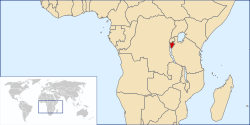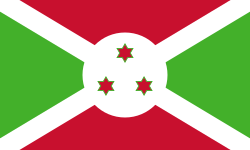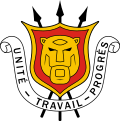

The following outline is provided as an overview of and topical guide to Burundi:
Contents
- General reference
- Geography of Burundi
- Environment of Burundi
- Regions of Burundi
- Demography of Burundi
- Government and politics of Burundi
- Branches of government
- Foreign relations of Burundi
- Law and order in Burundi
- Military of Burundi
- Local government in Burundi
- History of Burundi
- By period
- By subject
- Culture of Burundi
- Art in Burundi
- People of Burundi
- Religion in Burundi
- Sports in Burundi
- Economy and infrastructure of Burundi
- Education in Burundi
- Health in Burundi
- See also
- References
- External links
Burundi is a small sovereign country located in the Great Lakes region of Africa. [1] Geographically isolated, facing population pressures and having sparse resources, Burundi has the lowest GDP per capita in the world, arguably making it the poorest country on the planet. One scientific study of 178 nations rated Burundi's population as having the lowest satisfaction with life of all. [2]




